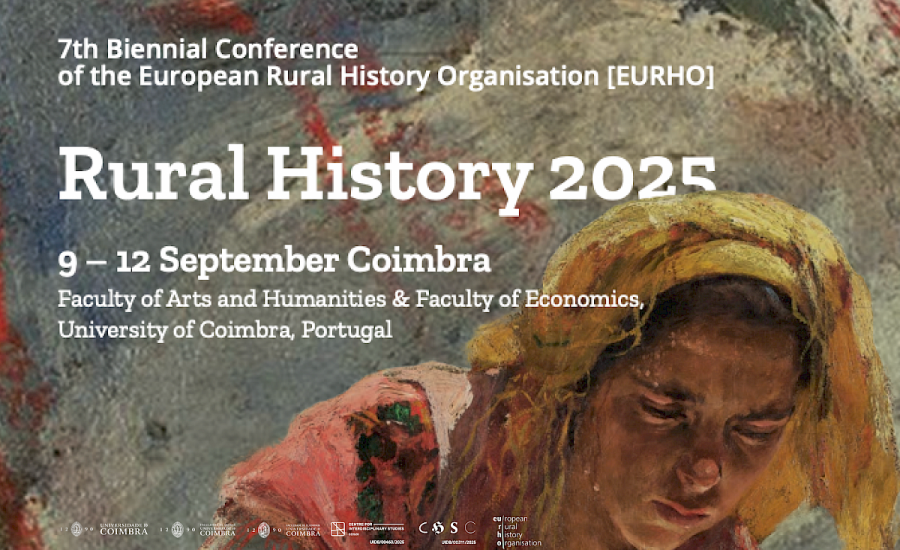New perspectives on rural history

The 7th EURHO Conference held in Coimbra with the participation of Histagra
Juan Gallego Estremera
Journalist, student of the Master's Degree in Contemporary History
Histagra researchers had a notable presence at the 7th Biennial Conference of the European Rural History Organisation (EURHO) held in Coimbra between 9 and 12 September. It was four intense days of meetings with colleagues, exploring collaborative projects and exchanging ideas and knowledge among the nearly 500 researchers participating in the sessions, coming from 40 countries
This attendance figure is significant, as over the years the conference has evolved from being basically an event for European historians to one that clearly attracts participants from other continents. This evolution towards globalisation enriches the prospects for increasingly interdisciplinary joint work and also allows for a greater impact of the research.
The evolution in disciplines, methodologies and perspectives reflects the relevance of rural history in today's world, as pointed out by Enikő Rüsz-Fogarasi from the presidency of EURHO, since Professor Dulce Freire took over for the 2025-2027 biennium by agreement adopted at the close of the Coimbra conference. According to Rüsz-Fogarasi, in an era marked by climate change, social fragmentation and sustainability issues, rural history offers not only a deeper understanding of the past, but also tools for resilience in the present and future.
The conference was organised into three plenary sessions and 124 parallel sessions, some divided into two or three parts, which gives a good account of the dynamism of the researchers affiliated with EURHO. The plenary sessions featured Inês Amorim (University of Porto) and Richard W. Hoyle (Reading). In their presentations (the first moderated by Daniel Lanero), they presented the results of their latest work and highlighted what has already been noted about the evolution of historians' work and the dynamics of internationalisation. The third plenary session was a round table discussion focused on reflecting on the changes in the study of the rural past following the emergence of revolutions such as artificial intelligence, with the central question of whether history may be on the verge of a radical shift.
The parallel sessions, which were impossible to attend due to their simultaneous nature, included classic issues in rural history such as access to land, unequal distribution of wealth, working conditions, revolts and violence, but with new approaches to the role of women, migrants and forced labour.
The hundreds of articles presented also reflected the traditional interest in agricultural, forestry and livestock production, although equally with innovative perspectives on water, climate change, animal production and different crops, forests and timber plantations. Each and every one of the sessions served to improve understanding of rural communities and territories and to open new windows of knowledge. The EURHO conferences are not only a privileged setting for sharing research, but also a meeting place that forges connections across borders, disciplines and generations of researchers. In the words of Enikő Rüsz-Fogarasi: ‘Together we continue to build not only a field of study, but a global intellectual community’.
HISTAGRA's presence was:
Álvarez, Marco A.: Notaries as lenders, A Fonsagrada (NW Spain), 1845-1875
Cabana Iglesia, A. e Otero, U. (2025): Modera a mesa Family Farming from A Gender Perspective in the 20th Century
Giraldez López, A. : -Artificial meadows and dry wetlands: a spatial analysis of the drainage, transformation and recovery of wetlands affected by Franco’s colonisation in A Chaira
Giráldez López, A. The promise of architecture: infrastructure and alternative modernity in the Francoist colonisation of Terra Chá
Parajua Carpintero, N. David Soto Fernández, Enric Tello (2025):. Towards a crisis of reproduction? Exploring family farming and food expenditure in Spain (1980-2021)
Esperante, B. Agricultural tractors and social change in rural communities. Galicia, Spain 1950-2000
Pan-Montojo, J. Mícheál Ó Fathartaig, Daniel Lanero Táboas: Agricultural techno-scientific services and rural society before World War II: precedents for post-war extension services or alternative socio-political devices?
Sanfiz Arias, R. Alberto González Remuiñán. Scientific transfer and co-creation during the 1930s in Atlantic agriculture: the Galician Seed Producers Trade Union
Fernández Blanco, M-. “Cousas de mulleres”: a gendered reading of the newspaper Terra e tempo (1963-1985)
Cabo Villaverde, M. Óscar Bascuñán Añover: organizadores mesa: Rural violences in Europe 1
Cabo Villaverde, M. Antonio Míguez Macho. The contentious Galician: a long-term analysis of violence in a rural society (1850-1950)
Jorge Pereira, J.. From threat to violence: the use of force in the border communities of Tomiño and Vila Nova de Cerveira
Sanfiz Arias, R., Lourenzo Fernández Prieto. The economic life of the peasant: Cruz Gallástegui Unamuno’s vision of environment and the agricultural economy of Galicia (1891-1960)
Soto Fernández, D., David Fontán Bestilleiro, Lucía Santiago Sanmiguel, Roque Sanfíz Arias, Lourenzo Fernández Prieto, Carlos San Clemente Erazo, Nuria Salmerón. The role of local knowledge in building sustainable landscapes. The case of the Barbanza commons (Galicia, Spain) in the past decades
López Fernández, T.. Deconstructing the “black legend”: the rural conflict in Lugo during Franco’s dictatorship
Díaz Geada, A. Alberto José Franco Barrera: organizadores mesa. Lass differentiation processes in contemporary rural societies 1
Ribeiro de Matos, V. . Development of a bibliographic database for the study of class differentiation in the rural world
Soto Fernández, D. .Manuel González de Molina, Gloria Guzmán Casado: Agrarian metabolism: a flow-fund model to analyse agroecosystem services in historical perspective. A case study from Spanish agriculture
Parajuá, N. David Soto Fernández, Enric Tello. Towards a crisis of reproduction? Exploring family farming and food expenditure in Spain (1980-2021)
Gómez Rodríguez, MA.: Popular construction of the wolf´s figure in rural Galicia in the 19th and 20th centuries: community, conflict and class differentiation